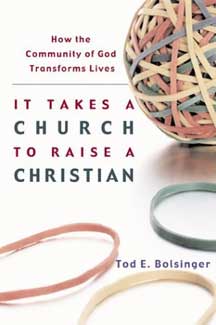|
"Freedom . . . For What?"
by Rev. Dr. Mark D. Roberts July 4, 2004
Preached at Irvine Presbyterian Church
Copyright © 2004 by Mark D. Roberts
Note: You may download this sermon at no cost, for personal use or for use in a Christian ministry, as long as you are not publishing it for sale. All I ask is that you give credit where credit is due. For all other uses, please contact me at mark@markdroberts.com . Thank you.
Scripture Reading: Galatians 5:13-16 (NLT)
13 For you have been called to live in freedom—not freedom to satisfy your sinful nature, but freedom to serve one another in love. 14 For the whole law can be summed up in this one command: “Love your neighbor as yourself.” 15 But if instead of showing love among yourselves you are always biting and devouring one another, watch out! Beware of destroying one another. 16 So I advise you to live according to your new life in the Holy Spirit. Then you won't be doing what your sinful nature craves.
Freedom, but . . .
Summer vacation has begun! No more school!
I can remember vividly the last day of school when I was a kid. What joy and exaltation! “No more pencils. No more books. No more teacher’s dirty looks.” No more schoolwork. No more homework. No more projects. Just two and a half months of freedom, sweet, utter freedom. What could be better?
But before too long it would happen. Inevitably. Ironically. Pathetically. My feeling of summer freedom would slowly morph into something else, something sad and unwanted. Boredom!
Parents, you know what I’m talking about. For a few days in early summer your kids are thrilled. But before too long you hear that classic complaint: “Mom, I’m bored. There’s nothing to do.” So you say, “Well, why don’t you call up your friends and figure out something?” And your child answers, “Oh, I don’t know. I’m just bored.”
Freedom from the demands of school. It sounds great at first. But is it enough? |
 |
In a much more serious vein, we’re seeing a similar drama playing out on the world’s stage. The people of Iraq have been set free from the brutal oppression of Saddam Hussein. They are beginning to experience unprecedented freedom from harsh despotism. But the jury is still out about whether this will turn out for the best or not for the Iraqi people. They are free from Saddam’s tyranny, but will they actually live as free people, or will they simply fall prey to the next version of bondage?
Freedom from Saddam’s cruel dictatorship. It sounds great at first. But is it enough?
Two Sides of Freedom
In our day we mostly think of freedom as freedom from something that constrains or subjugates us. On the last day of school we celebrate freedom from the daily demands of education. On the Fourth of July we celebrate America’s freedom from British domination. Surely freedom includes freedom from. But this isn’t the whole picture.
There is another side to freedom, a side we sometimes neglect. It’s freedom for something. It’s the freedom to be able to do things we haven’t been able to do in the past. The freedom of summer vacation, rightly appreciated, isn’t just the freedom from school. It’s also the freedom for lots of things: the freedom for going to camp, the freedom for getting enough sleep, the freedom for going on vacation, the freedom for doing some fun reading, and so forth and so on.
And, in the best case scenario, freedom from political oppression is the freedom for expressing your opinions without fearing that you will be tortured or killed. It’s the freedom for voting for the candidate of your choice, the freedom for making your country a better place for all citizens.
If you only have freedom from, without freedom for, then you don’t have real freedom.
Freedom in Christ
The same is true when it comes to our freedom in Christ.
In the middle of the first-century A.D., the Christians in Galatia (the middle of modern Turkey) were struggling with the whole notion of freedom, which is why Paul wrote a letter to them. On the one hand, many of the Galatians who had begun their Christian life in the freedom of Jesus Christ were turning to legalism, trying to earn God’s grace by religious actions. On the other hand, some of the Galatians were abusing their freedom, doing things that dishonored God. So Paul wrote to call the Galatians to live in freedom, both freedom from and freedom for. In his letter he clarified, both for the first-century Galatians and for us, the meaning and purpose of Christian freedom.
As believers in Jesus Christ we are free from the tyranny of sin and death. We no longer need to fear that our sin will lead to eternal separation from God, the ultimate death. Moreover, we no longer need to be dominated by sin’s power in our life. Through our faithful participation in the death and resurrection of Christ, we have been set free from those things that once bound us.
Moreover, we are set free from trying to earn God’s favor through keeping the law, as if this were even possible in the first place. As Paul writes in Galatians 5:1: “So Christ has really set us free. Now make sure that you stay free, and don’t get tied up again in slavery to the law.”
Of course there’s a danger inherent in this sort of freedom. It’s the danger of antinomianism. It’s the danger of saying to yourself, “Great! So I don’t have to keep God’s law to earn salvation. Now I can do whatever kind of sin I want, without worry. Whooppee!” Although it sounds silly when I put it so bluntly, this is a genuine danger, and one that snags most Christians at one time or another.
I was talking with a Jewish friend about the grace of God given in Christ and how this grace is given without cost, by definition. “God’s love is not something we earn,” I said, “nor is his salvation. It’s a gift, given freely in Christ.” My friend responded, “But that’s crazy! If salvation is given freely, then people won’t have any motivation to be good. What will keep them from sinning all they want?” Indeed! A great question.
The biblical answer is that Christian freedom isn’t only freedom from sin, death, law, and the need to earn God’s favor by works. Christian freedom is also freedom for, it’s freedom for doing what’s right and honoring to God. Formerly, when you were caught in sin, you weren’t able to please God, no matter how hard you tried. But now, in Christ, you are free to do what God desires, even what his law dictates. Yet you do this, not in order to earn God’s favor, but in response to that favor already given in Christ.
Here’s the good news of your freedom in a nutshell: You are now free to do the right thing. You are free to live your life for God. You are now free to live the best possible life there is. In Christ you have freedom from and freedom for.
Freedom for Loving Service
Paul is quite specific in Galatians about what our Christian freedom is for. Let me read a portion of Galatians 5 once again:
13 For you have been called to live in freedom—not freedom to satisfy your sinful nature, but freedom to serve one another in love. 14 For the whole law can be summed up in this one command: “Love your neighbor as yourself.”
Did you catch that? Don’t use your freedom for your sinful nature (“the flesh” in Greek). Rather use it “to serve one another in love.” The English misses the shocking irony of the Greek, which literally reads, “You were called to freedom . . . . So use your freedom by becoming slaves to each other in love.” Slavery is the antithesis of freedom, since it involves being owned by another person. Yet Paul says that we should use our freedom in Christ to choose to act as if we were slaves to each other. We’re not just talking about casual and convenient serving here, but committed and consistent and self-sacrificial servanthood – exactly the sort of thing we have seen in Christ himself (so Phil 2:1-11).
Now you may want to say, “Wait a minute! I’m not comfortable with that slave metaphor. Couldn’t that become abusive? Couldn’t it lead to unhealthy domination?” Surely it could because Christians still sin, even after they have put their faith in Christ. But that’s not Paul’s intention. Notice that he calls us to mutual servanthood, not a one-way street of slavery and domination. If I am committed to serving you sacrificially, and you are committed to serving me in the same way, then there’s no danger of abuse or domination.
Moreover, we are to serve as slaves to one another “through love.” Love not only enables me to serve you and you to serve me, but it controls the nature of our servanthood. Thus if love is “in charge,” as it were, then, once again, the dangers of abuse and domination are minimized.
We see a marvelous illustration of how we are to live as free people in the life of Nelson Mandela. For decades he labored in South Africa to bring an end to apartheid. Ultimately his revolutionary strategies got him in trouble with the government, who put him in prison. Beginning when he was 45 years old, Nelson Mandela was confined in a South African prison – for 27 years. Finally, in 1990, at the age of 72, he was released.
One might suppose that, after almost three decades in prison and at the age of 72, Nelson Mandela had earned a comfortable, restful retirement. But he saw freedom from prison as freedom for service. So he began to use his new-found freedom to work for the cause of racial reconciliation and justice in South Africa. Four years after his release, he was elected as the President of this country, the first African president of South Africa.
Now it’s unlikely that you and I will ever make an impact on the world like that of Nelson Mandela, but our life in Christ should mirror his, in a way. You and I have been set free from the prison of sin, death, and bondage to the law, not so we can live for our own comfort, but so we can serve one another in love.
And, I might add, when we look at the broader sweep of New Testament theology, we realize that we have been set free, not only to serve our brothers and sisters in Christ, but to live as servants of Christ in and for the world. Last month we were reminded again and again of our call as a church to outreach, whether we are reaching across the street to students at Woodbridge High School, or across the world to children in China or Muslims in Africa. Christ has set us free so that we might give our lives away in his service, loving one another and reaching out to love our neighbors, no matter where they might live.
We’ve already seen wonderful pictures of loving service this summer, with many more to come. I think of those who counseled at Indian Village and Adventure Mountain, giving a week of their lives to serve kids for the sake of Christ. And I think of folk who have stepped forward to teach summer Sunday School. Or, looking ahead, I think of those who are getting ready to serve as junior high counselors at Calvin Crest, or as leaders at VBS, or as team members in several missions trips, and so on.
Sisters and brothers, Christ has set us free to serve each other in love, and, together, to serve the world around us. The more we do this, the more our neighbors will see Christ in us and be drawn to him.
Freedom in the Spirit
Before I conclude this sermon, I must mention one other crucial aspect Christian freedom. I’ve said that we have been set free from bondage to the law. We do not have to try to earn God’s favor by doing the right things and avoiding the wrong ones. His favor – which we call grace – has already been given to us in Christ.
But I want to respond to my friend’s concern that, without the law, we’ll have little motivation for doing what’s right. What’s to keep us from living for ourselves, if we are free from the law? What is there to ensure that we will use our freedom for honoring God and for serving one another in love?
We find an answer in Galatians 5:16: “So I advise you to live according to your new life in the Holy Spirit. Then you won’t be doing what your sinful nature craves.” This is such an important verse, yet it is often mistranslated. You know I generally prefer the NRSV because it is usually the most accurate English translation. But it really botches up Galatians 5:16. The NRSV reads, “Live by the Spirit, I say, and do not gratify the desires of the flesh.” There are two imperatives here: 1) Live by the Spirit; and 2) Do not gratify the desires of the flesh. But this misses the sense of the Greek, which reads quite clearly and literally: “But I say, keep on walking in the Spirit and you really won’t fulfill the desires of the flesh.” Notice that we have one imperative and one result: Imperative: Keep on walking in the Spirit; Result: And you really won’t fulfill the desires of the flesh.
Do you see the difference? In the NRSV’s mistranslation we have split attention. We’re to walk in the Spirit and to corral the flesh. But Paul’s original intention is more focused. We’re to walk in the Spirit, and keep on walking in the Spirit, and freedom from the flesh will take care of itself. In other words, you’ll experience freedom from sin, not when you pummel your body to make it stop sinning, but when you allow the indwelling Spirit of God to fill your heart and guide your steps at all times.
Thus, what keeps us from unbridled sin, even when we’re not bound by the law, is the very power of God alive within us and among us. God’s Spirit will help us to do what the law cannot do. And this includes serving one another in love.
I expect that many of us find ourselves today struggling with “the desires of the flesh.” And I expect that many of us are also struggling to serve one another in love. So what can we do?
First, remember that Christ has set your free from sin, death, and bondage to the law. Rely on him. Thank him. Trust him. Center your life in him. In Christ alone will you find true freedom.
Second, don’t rely on your own strength, but on God’s strength through the indwelling Spirit. What you cannot accomplish on your own God can and will accomplish in and through you. Remember Paul’s words to the Philippians, “And I am sure that God, who began the good work within you, will continue his work until it is finally finished on that day when Christ Jesus comes back again” (Phil 1:6).
Third, when you struggle, call out to God for help. And let the Spirit of God in this community share in your struggle. You weren’t mean to do this alone. The Spirit’s power is available to you, not only inside of you, but also in the community of Christ’s people.
Christ has set you free from sin and death. Christ has set you free for serving others in love. Christ has given you his Spirit to help you experience the fullness of freedom. This is good news! So live it out!
Amen!
Home
|




